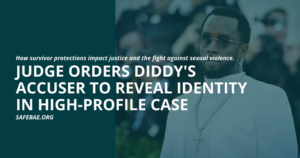Judge Orders Diddy's Accuser to Reveal Identity in High-Profile Case
How survivor protections impact justice and the fight against sexual violence.
The Complexities of Justice and Survivor Privacy
In a recent legal development, a judge ordered a sexual assault survivor to publicly reveal her identity to continue her lawsuit against Sean “Diddy” Combs. This decision, handed down by U.S. District Judge Mary Kay Vyskocil—a woman—raises critical questions about the balance between transparency, fairness, and the protections afforded to survivors of sexual violence.
Survivors already face immense barriers when coming forward: societal stigma, fear of retaliation, and the emotional toll of reliving their trauma in a public forum. When the judicial system demands they forfeit their anonymity, it can feel like an added betrayal. Protections exist in many cases to shield survivors’ identities, so why weren’t they applied here? Does bias—implicit or otherwise—play a role in how these decisions are made, even by those who might be expected to empathize?
This article explores the broader implications of this decision: how it affects survivors, what it reveals about the justice system, and why safeguarding survivor privacy should remain a cornerstone of addressing sexual violence. At a time when survivors are courageously stepping forward, we must ask ourselves whether the legal system is truly supporting them—or creating new barriers in their pursuit of justice.
The Barriers Survivors Face
Coming forward as a survivor of sexual violence is already an act of immense courage. The decision to file a lawsuit or report an assault often brings with it a host of challenges: societal stigma, fear of retaliation, and the emotional toll of reliving trauma. For many survivors, anonymity serves as a vital protection, offering a sense of safety and privacy while navigating an already daunting process.
In high-profile cases like Sean “Diddy” Combs, these stakes are even higher. Protections could have been implemented that would allow the legal process to proceed without compromising the survivor’s safety or the defense’s ability to present its case. Shielding a survivor’s identity would not have impeded the defendant’s rights or the fairness of the trial. Yet, by permitting her name to become a matter of public record, the court exposed her to intense scrutiny, potential harassment, and a media circus that could retraumatize her.
This decision signals a disregard for the safety of survivors, especially when the accused holds significant power and influence. For survivors in cases like these, the risks go beyond the courtroom—they extend to the court of public opinion, where narratives are shaped, and lives can be further damaged. By prioritizing public transparency over survivor protection, the legal system perpetuates the very fears that keep so many from coming forward in the first place.
The question remains: why weren’t these protections prioritized? Survivors deserve a system that supports them, not one that adds to their burden. When judges and courts fail to consider the profound consequences of public exposure, they send a message that accountability for perpetrators is secondary to the spectacle of the trial.
The Role of Judges and Systemic Bias
Judges play a critical role in determining whether survivors are afforded anonymity in sexual assault cases. These decisions are meant to balance the defendant’s right to a fair trial with the survivor’s right to safety and privacy. However, when a judge denies anonymity, particularly in high-profile cases, it raises important questions about systemic bias and the priorities of the legal system.
In the case against Sean “Diddy” Combs, U.S. District Judge Mary Kay Vyskocil’s decision to make the survivor’s identity public has been met with criticism, especially given the protections that could have been applied. High-profile cases like this one often carry an inherent power imbalance—where the accused has significant resources, influence, and public support, while the survivor is left vulnerable to public scrutiny and potential backlash. The decision to allow her identity into public discourse only amplifies this imbalance.
Bias—whether implicit or explicit—can shape judicial decisions in ways that disproportionately harm survivors. Even well-meaning judges can fail to grasp the unique risks survivors face, especially in cases involving powerful defendants. When protections are denied, it suggests that the system may be more focused on maintaining procedural norms or catering to public interest than on ensuring the safety and dignity of survivors.
This case also highlights the inconsistency in how anonymity is applied across jurisdictions. In similar cases, survivors have been allowed to proceed under pseudonyms, ensuring they can seek justice without sacrificing their privacy. This disparity underscores the need for clearer guidelines and a more survivor-centered approach to legal proceedings.
Ultimately, judges have the power to set precedents that either protect or harm survivors. It’s critical to question decisions like these and advocate for reforms that prioritize survivor safety without compromising the integrity of the legal process.
The Broader Impact and a Call to Action
The decision to expose a survivor’s identity in Sean “Diddy” Combs’ case has sparked an important conversation about how the justice system can better protect those it’s meant to serve. While this ruling has raised concerns, it also highlights the need for continued advocacy, education, and systemic reform to ensure survivors feel safe and supported when coming forward.
Moments like this remind us of the power of collective action. In recent years, movements like #MeToo have demonstrated how survivors’ voices can create meaningful change. While setbacks still occur, every conversation, every policy shift, and every act of support brings us closer to a world where survivors are believed, supported, and empowered to seek justice without fear.
At SafeBAE, we believe in the power of prevention and education to transform how society addresses sexual violence. By teaching young people about consent, healthy relationships, and bystander intervention, we’re planting the seeds for a safer, more compassionate future. These lessons empower the next generation to be agents of change, ensuring that survivors are met with understanding and accountability, not judgment.
We invite you to join us in this mission. Whether it’s donating to fund our programs, bringing SafeBAE to your school, or simply sharing our resources with your community, your support helps us continue this vital work. Together, we can create a culture where survivors are protected, respected, and free to seek justice.
Donate today at SafeBAE.org/Donate and help us keep this movement growing.
Thank you for being a part of the change!


